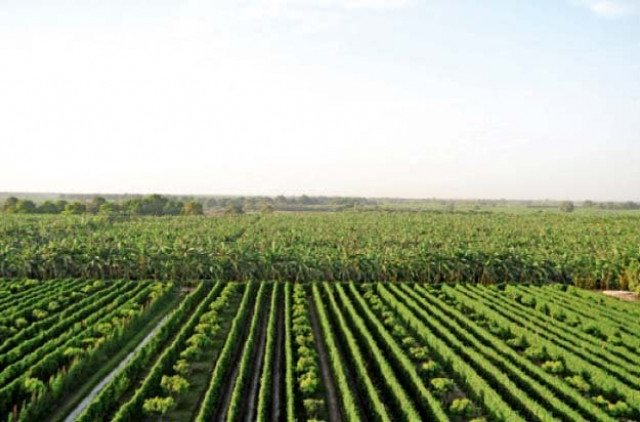Returning IDPs find agriculture in FATA tough till
Farmer says farms, orchards have grown slowly

Farmer says farms, orchards have grown slowly. PHOTO: EXPRESS
“You cannot imagine the pain of having to flee your home and having to live the life of an immigrant in your own country,” recalls Khadi, the pain briefly reflecting on his face.
But the smile soon returns to his wrinkled face as he glances up towards his grandson.
His village of Kalanga in Bara was among a host of settlements which were affected by the conflict. Between the militant strongholds in Khyber Agency and a full-scale military operation, Khadi’s family had little choice but to leave their homes and lush fields for safer areas.
“We left our land because of the operation. There was no other option,” recalls Khadi.
The wizened farmer finally returned to his village in 2015 along with his son Saeed Khan, daughter-in-law and his two grandchildren.
With nothing but the allure of home on their mind, they were thoroughly unprepared for what awaited them.
“I could not believe my eyes. My orchards and fields were barren and deserted,” the once progressive farmer said, adding, “I had no clue from where to begin and secure a livelihood for my family.”.
But with his 26-year-old son Saeed by his side, Khadi started to rehabilitate the six to seven acres of his land.
With thousands of families returning to their war-scarred homes and hundreds more still waiting to return, providing alternative livelihoods for temporarily displaced people returning has been a challenge for the federal and provincial governments.
However, the year Khadi returned home, the Food and Agriculture Organisation of the United Nations (FAO), with assistance from the Japan International Cooperation Agency (JICA), began work on recovery and development of agriculture in the Federally Administered Tribal Areas (Fata).
Fata’s economy is based on subsistence agriculture and livestock rearing, providing a livelihood to around 97 per cent of the population. However, less than nine per cent of the total geographic area of the tribal area is cultivated.
To make matters worse, 38.15 per cent of the cultivated land is irrigated while the remaining farms rely on rainfall to meet their water requirements. While yields per hectare for rice and maize are slightly lower than national averages, the yield per hectare for wheat in Fata is just 38 per cent of the national average.
“We were able to reclaim our land,” Khadi says, adding, “We also received wheat seed, oat seeds for fodder, orange, plum and guava plants for the orchards and kitchen garden kits.”
Khadi’s 26-year-old son approaches carrying his daughter Sara. They watch as Khadi gets up to tend to their vegetable garden in one of the fields.
“We were given maize seeds,” Saeed recalls of the assistance they received under the programme.
“From the crop we grew last year, we were able to grow maize again this year,” he remarked.
Saeed has a bachelors’ degree in business administration from a university in Peshawar, but he opted to help his father restore their lands.
Khadi returns, clutching some freshly picked out okra from his vegetable garden, sharing business strategy.
“We harvested 120 maunds of wheat this season and will sell it in the winter when the prices increase,” he says.
The FAO project, which began in July 2015 and is scheduled to end on June 30, 2017, has supported as many as 21,192 farmers in the Khyber and Kurram Agencies of Fata, providing crop inputs to reclaim around 1,151 hectares of land.
For Khadi, while the progress has been visible, it remains slow.
Since Bara is close to the settled areas of Peshawar, the availability of inputs is more. However, in the more remote areas of Fata and when more internally displaced people return, the process of providing livelihood to people would have to be expedited.
Published in The Express Tribune, June 24th, 2017.













COMMENTS
Comments are moderated and generally will be posted if they are on-topic and not abusive.
For more information, please see our Comments FAQ